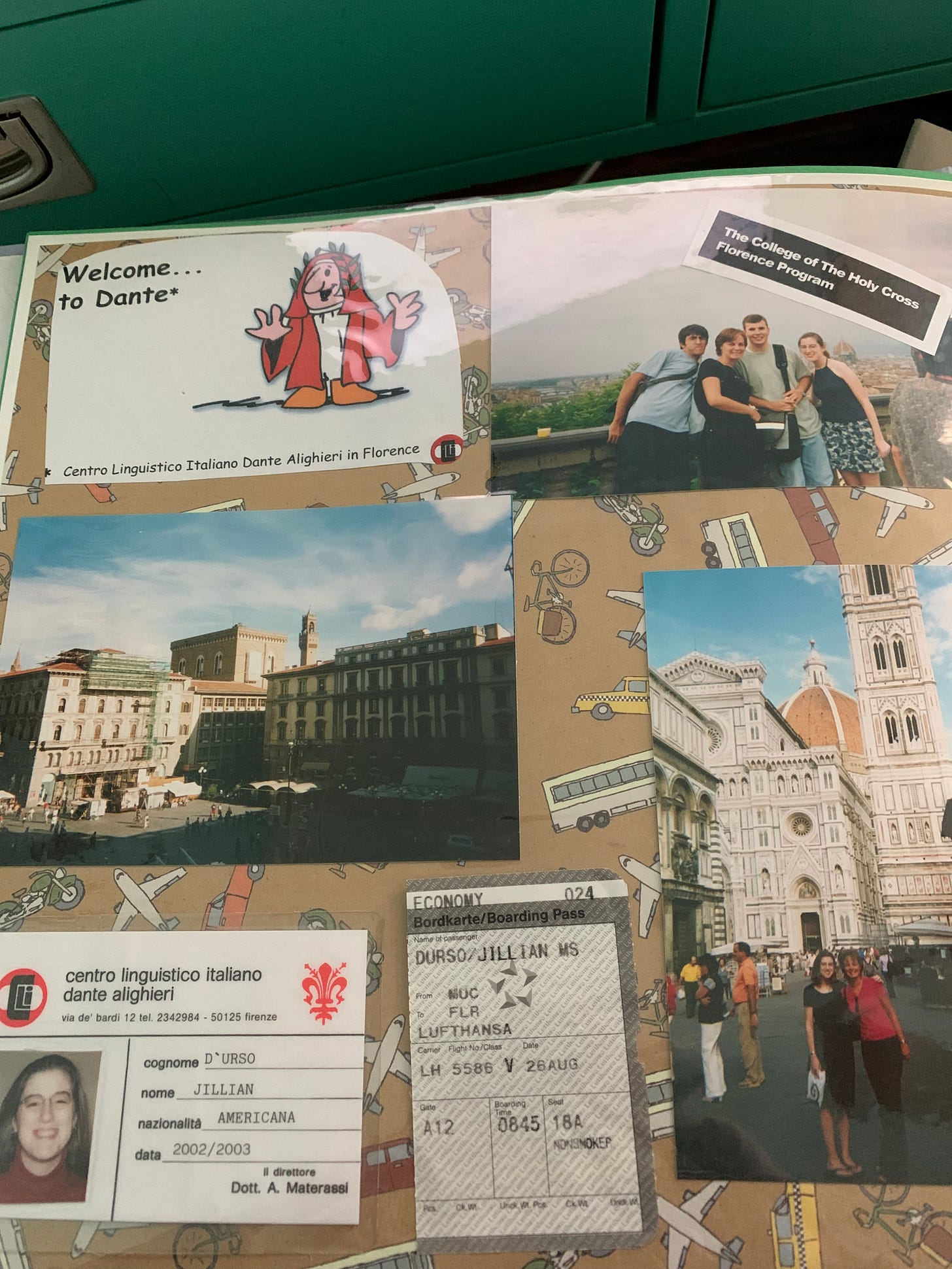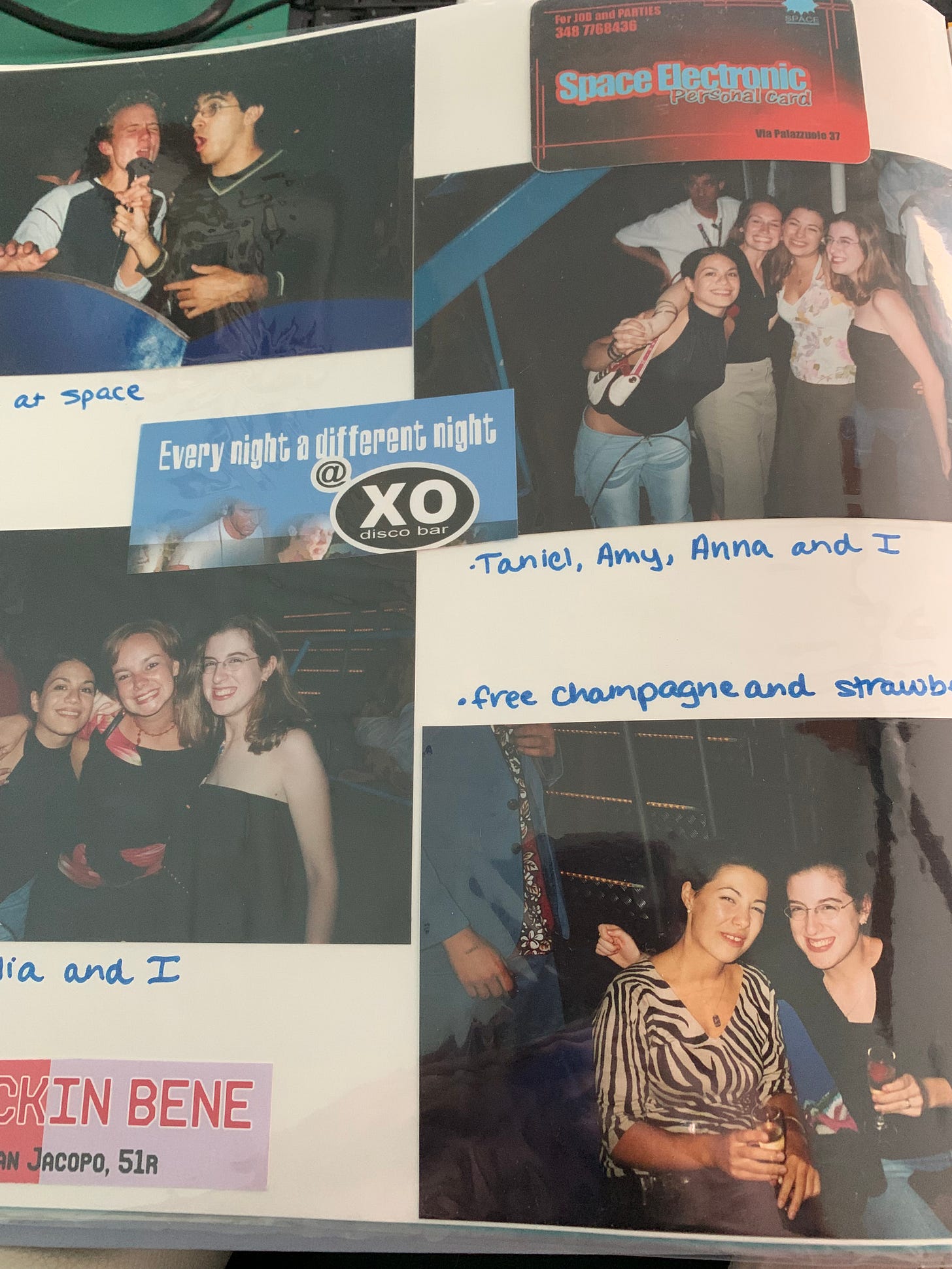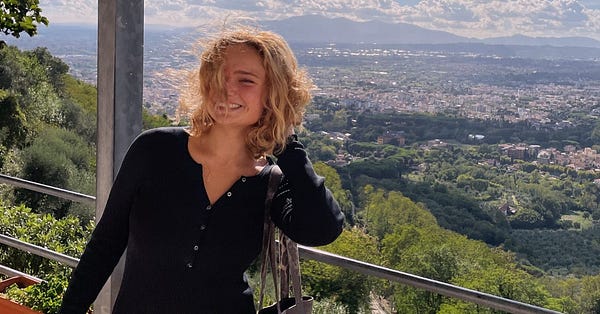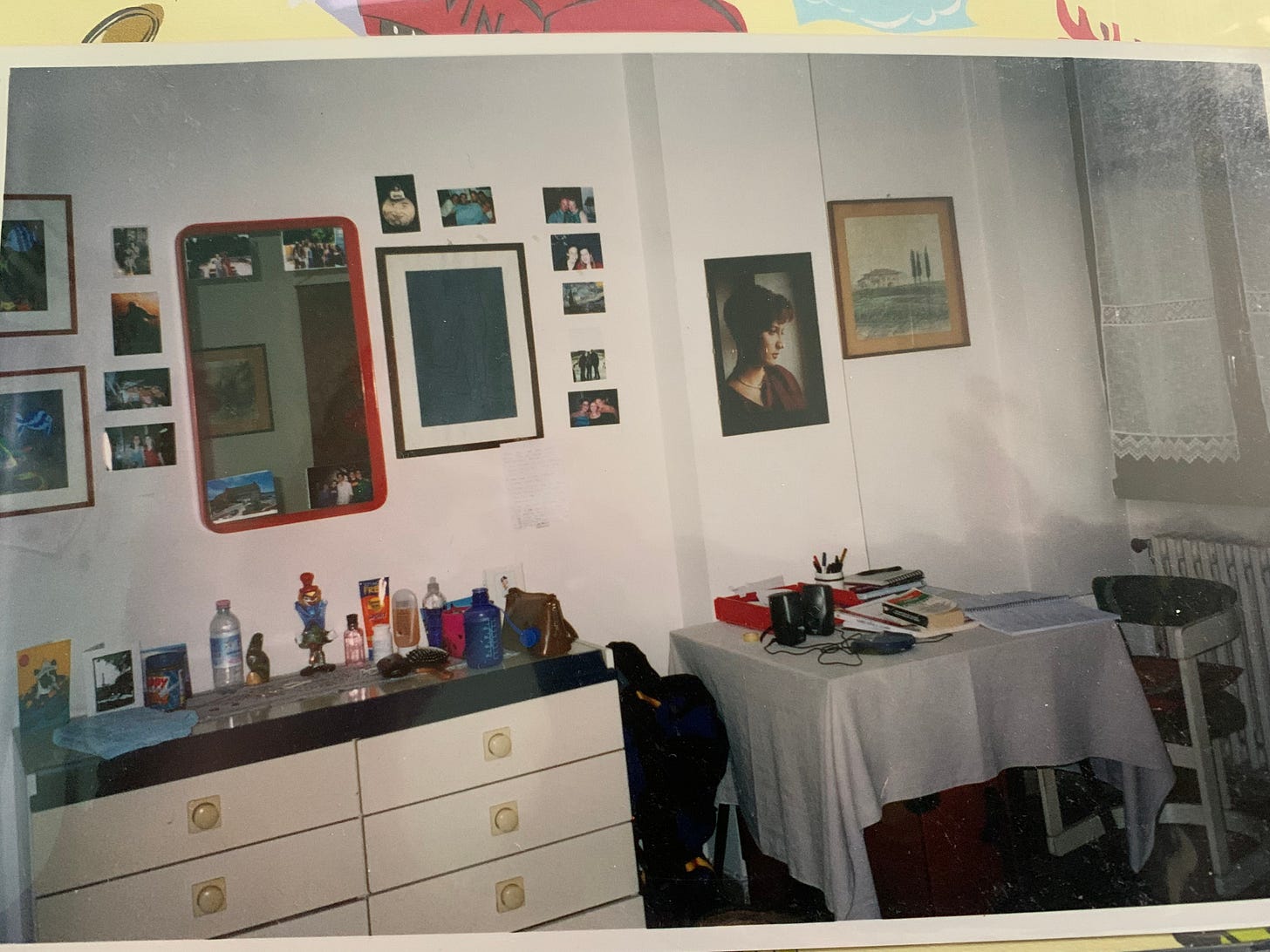Early & Alone #83: Adrift Abroad
On the pains and pleasures of the study abroad experience
I made a scrapbook (two, actually) when I got home from studying abroad my junior year of college. I went to Michael’s Craft Stores and bought stickers and paper and little scissors. I culled my collection of photos, ticket stubs, programs, and other things I’d hoarded from my 9 months living in Florence, Italy. I worked on the scrapbooks for months. I haven’t made any scrapbooks since. Maybe it’s an outdated pastime. But mostly I know I made those scrapbooks because I knew the opportunity to have lived and studied in Florence was a once-in-a-lifetime one, one that was special and that I should never forget.
I took a look through those scrapbooks yesterday, struck by how many things I did, how many trips I took, how many people I’d met and friends I’d made. It was astonishing. It all came rushing back—the private jokes, the places, the people.
I’m so glad I made these scrapbooks because they remind me of so many good memories and stories. But they’re not the whole story. There’s so much missing from these scrapbooks.
Last week, an article in Insider went viral. The headline was “I’m an NYU student who studied abroad in Florence. I hated every aspect of my semester abroad.” Predictably, much of the response to this article has been incredulity and hate and one iconic tweet.
There’s also been a lot of debate about whether it was appropriate for Insider to allow a 19-year-old to publish what they knew would blow up in her face. I think we can all agree that Insider isn’t the pinnacle of journalism, people. And by the writer’s own account, she’s doing fine.
Listen, the article is not good. I, too, found myself incredibly annoyed by this girl’s privilege and inability to read the room. But I have long struggled with reconciling my own study abroad experience with those of others, including some of my closest friends, and the familiar narrative of “American studies abroad, has an amazing time, and finds their true self in the process.” Because I did have some amazing times, and I did learn A LOT about myself…I just didn’t really like what I learned. What do you do with that?
I thought it would be interesting to break down my own experience using this article writer’s reasons for hating her time abroad.
First up, we have: “For starters, living with 7 people was not easy.”
Um…yeah. Listen, girl, this is going to be true no matter where you live.
I did not live with 7 people in Florence. I did live with an Italian grandmother and another student from my college, as well as several other students who cycled in and out of the other spare room in the apartment on the edge of the city. The Holy Cross study abroad program was vastly different from the NYU program. Indeed, it was different from most of the American college programs that have colonized Florence. For one, there were only five students in my program. For another, we all lived with locals, most of whom were older Italians living alone and renting out their extra space to students. And, crucially, we took classes at the University of Florence, in Italian, with other Italian students. In order to go to Florence, you needed to speak Italian. There was no “Holy Cross in Italy” which was the way most other schools operated their programs, including NYU.
The woman I lived with was not unkind, but nor was she welcoming or understanding. The deal was she got money for allowing us to live in her apartment, do our laundry, and provide us with breakfast and dinner on weekdays. She was also supposed to converse with us, which was rare, since she was off gallivanting most nights, leaving our disappointing packaged dinners on the stove. We were also explicitly told we were paying for our rooms and access to the kitchen, but we were not allowed in the living room, even when she was out. Of course, my fellow student and I flouted this rule, sneaking into the living room and watching MTV whenever we could. We were both poor, too poor to go out every night like most American students, and we weren’t really drinkers. She went so far as to unplug the TV, close the living room doors and put a ladder in front of them, and give us lectures about needing her own “private space.” I understood this, but it was also horrific to feel unwelcome, a burden in the place I lived for nearly a year when I was already lonely, homesick, terrified, and on the brink of what was essentially a nervous breakdown.
“The pressure to travel on weekends became too much for me”
The article writer says her fellow students were traveling every weekend as some form of “escapism” whereas she wanted to stay in Florence, but then she goes on to list how many trips she herself took.
In my own experience, there is a lot of “pressure” to travel while you’re abroad. It’s so easy compared to being in the U.S.! Why wouldn’t you take advantage of the opportunity while you can? I did as much traveling as I reasonably could, but again, I didn’t have the budget to take as many trips as I would have liked. I’d worked my tail off the summer before I left, saving $6,000 to spend for the year. We didn’t have work visas, so we couldn’t work while in Florence. Basically, my tuition, room, and board were covered because I paid the same amount in tuition to Holy Cross as I would have were I on campus—an amount that I essentially borrowed in student loans and would be paying back for years and year—until I got hit by a car and could finally pay off my mountain of debt.
Anyway! I still count myself as extremely fortunate to have been able to visit the places I did—Venice, Rome, Sienna, Sorrento, Cinque Terre, Naples, Corsica, Milan, Montecatini, London, Paris, Amsterdam, Brugges, Brussels. Lucky, lucky, lucky.
“Throughout my semester in Florence, Italian people were hostile toward me”
OK, this one is kind of hilarious. Florentines are not known for their hospitality. They’re not as rude as the French, but they’re not entirely welcoming. That said, I didn’t really encounter out and out hostility—even though I was there 20 years ago, when the U.S. invaded Afghanistan, and there was a lot of anti-American sentiment. (I told people I was from England, if they asked.) That being said, they don’t OWE anyone anything, ESPECIALLY the American students who have essentially invaded their ancient, gorgeous city. Most of whom don’t appreciate it…as illustrated by this bonkers article.
I’d hoped to make friends with Italians, but I didn’t. I made plenty of friends but most of these were students from other places—Scotland, England, Spain, Germany, other states in the U.S. I took a community theater class as my independent study project. I was the only American in the class. The Italians in the class (all women, except for the instructors, who were men) were friendly and inquisitive, certainly far from hostile. Though I never became close with them outside of class, I did feel like a part of the group.
“My life back in New York went on without me, and it felt like I was wasting a semester”
I didn’t especially feel this one. Many of my close friends were also doing study abroad in different cities, and though I missed them, I wouldn’t have been able to hang out with them on campus, either. I missed my high school friends, but I also knew how lucky I was to be in Italy. I didn’t really have aspirations for leadership roles on campus or anything like that. My biggest regret is giving up my amazing campus job, which I couldn’t get back senior year, but that was the worst of it, I think.
The article writer doesn’t cover what I struggled with the most when I was studying abroad, which was my mental health. I had had panic attacks before, starting in my freshman year, but I still didn’t really understand them as such. But being so far away from everyone I knew and loved exacerbated my anxiety to a really scary degree. I felt trapped, by the language, my lack of money, my lack of close friends, my own insecurities and fear. I had a hard time making friends, being vulnerable, being myself. I didn’t drink. Honestly, I don’t know why I even did study abroad other than I had been studying Italian since I was 14 and had always wanted to go and knew I’d never get the chance to live there otherwise. I didn’t really think about what it would actually be like.
I’d take long walks around the city, alone, not really seeing anything around me. I wasn’t eating normally. I shook, a lot. The anxiety and panic attacks got so bad that I was sent to an Italian hospital, where I had to explain to an Italian doctor, in Italian, how I was feeling. He prescribed Xanax, which came in a little vial. I put it in my tea every morning, forcing myself to drink the bitter liquid (I can still taste it, all these years later). But it wasn’t helping and I hated the taste, so I just stopped taking it, not understanding how dangerous that was. And then I hopped a plane to London to spend New Years with friends. Not the best idea. It all caught up with me in Paris, where I spent the whole time in bed in the hostel, so sick I couldn’t eat. I went back to Florence early, where I didn’t eat more than some crackers for about a month. Stress is powerful.
I look at the photos from that year, how young I was, and I want to take that version of me and shake her, tell her to loosen up and get a grip and just enjoy herself, for once!! Have the wine, go to the party, talk to people! But I also feel compassion for her. I was 20. I didn’t understand much of anything, much less mental health. It would be years before I went on regular medication, which finally regulated my panic attacks. It’s still an ongoing process, the letting loose and trusting myself. At least I’ve mastered the wine part.
But in Florence, I learned how to be alone. I wrote. I learned that writing could save me. I learned that experiences are never all good or all bad. They all have layers and complications, just like people. I’m thankful to that version of me, too, for being brave enough to go, for taking that chance. I do think it changed my life for the better, despite how scary and terrible so much of it was, under the surface.
Did you study abroad? What was your experience like? Have you ever had an experience that was difficult at the time but you appreciate in hindsight? Tell me about it in the comments!
Bright Spots:
🎭 Jeff & I rewatched Baz Luhrmann’s Romeo & Juliet last week and damn, does it hold up. It was so original and fun and stunning. Also, I completely forgot Paul Rudd is in it. What a treat. It’s streaming on HBO Max if you want to go relive your 90s memories.
🎤 I loved this episode of the On Being podcast—an interview with Isabel Wilkerson about race in America. She gives so many great metaphors and insights. Caste has been on my list since it came out—need to read it!
🚴🏼♀️ I took this Peloton 2000s ride earlier this week and it kicked my butt. But I almost didn’t care because the music was SO GOOD.
🐕 Loved this article on loving an old dog.
✈️ This NYT article (gift link) about a woman taking a trip to Morocco with a bunch of other women to make friends is so good. And though the writer (Caity Weaver, always a banger) says that the trip was exhausting, it sounded kind of perfect to me.







"I was outside of my comfort zone, which is kind of the whole point, but I did not like that and will list reasons as to why that's not my fault, even though it is."
I did not study abroad for a few ridiculous reasons (I was in a long-term relationship, and I wanted to graduate early, which I did), and I wish I had taken a year, broken up with the partner since our relationship didn't survive anyway, and studied abroad. It all worked out in the end—I'm a journalist and one of my beats is travel, so I've more than made up for it. But still, it's an experience I can't really mimic in my life now. Funny enough, I wrote in my newsletter a little about this person's study abroad article, and my summary was: I am deeply grateful that when I was a college student, I didn’t have a clickbait website as a platform for my unedited thoughts.
Also, thank you for sharing Gabrielle Zevin's article. As someone who lost an aging pet a little over a year ago, it was quite sweet to read.